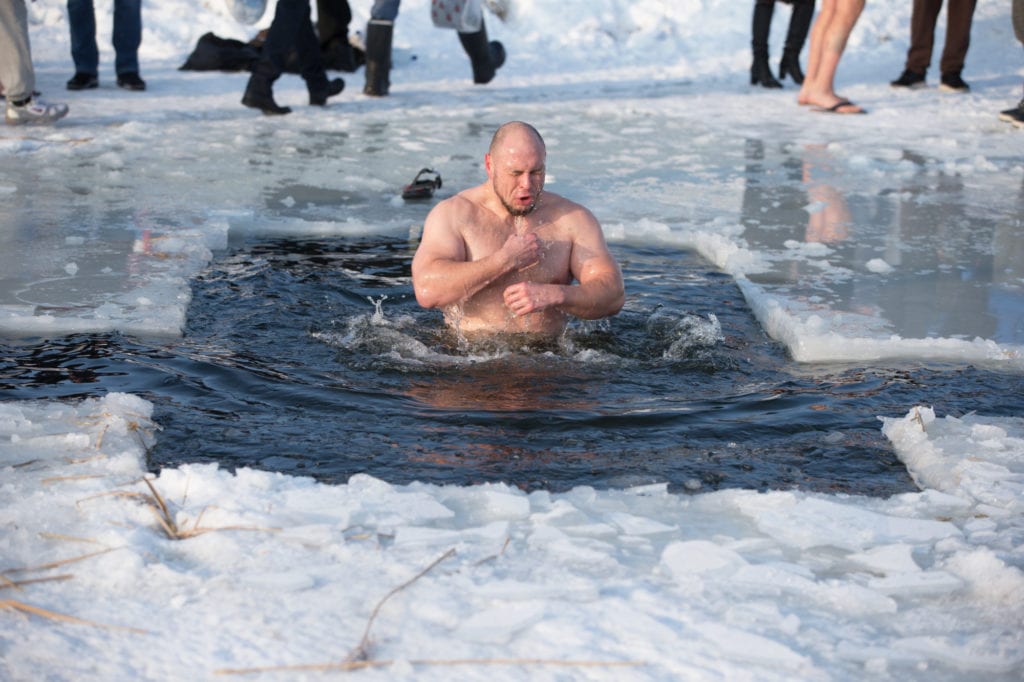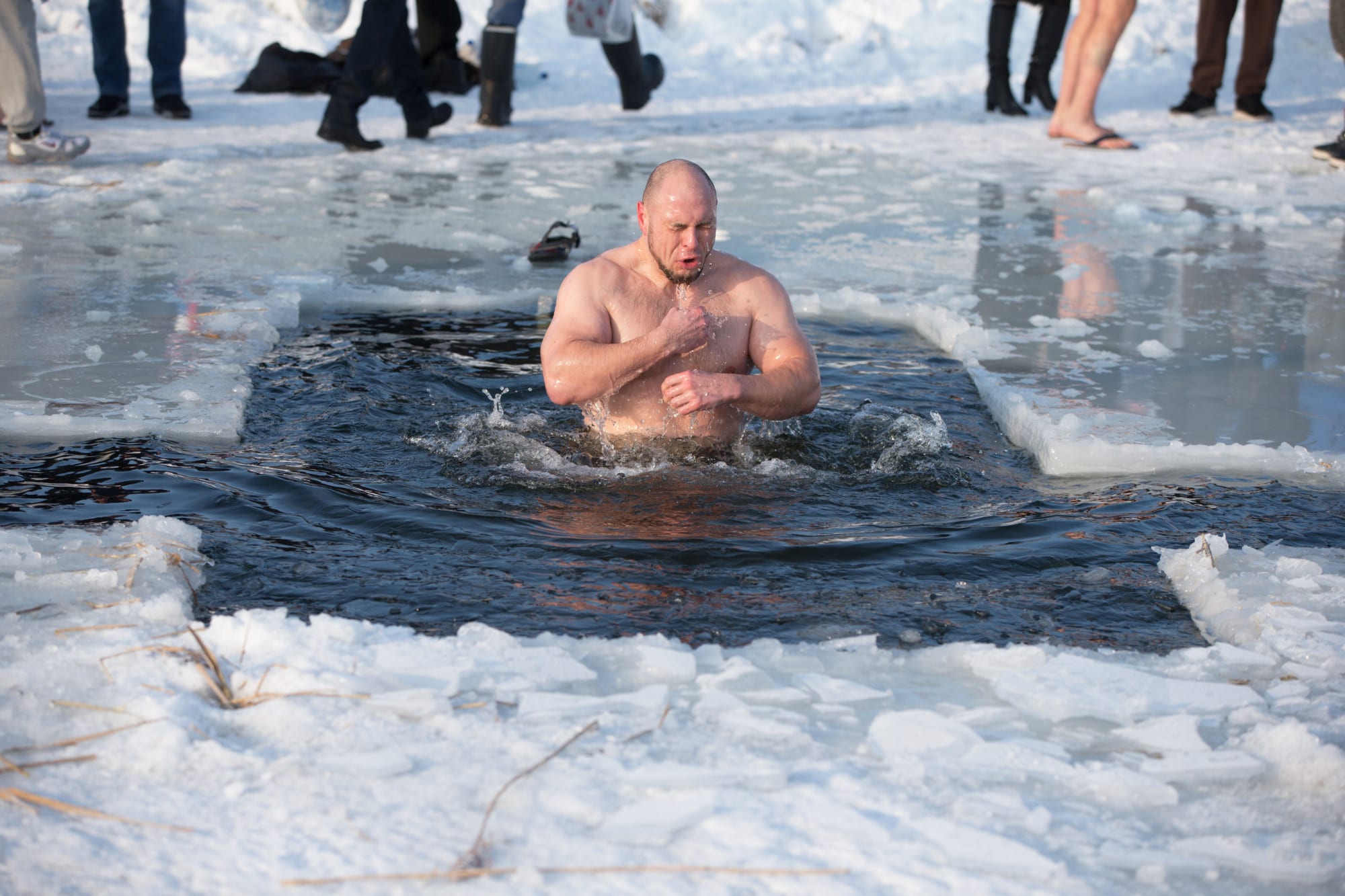
Belarus, Gomel, January 19, 2017. Lake Chernoye. Epiphany. Bathing in the ice hole. Plunge into the ice water
The International Ice Swimming Association defines “cold water swimming” as anyone willing to swim in water temperatures that are around a frosty 5 degrees Celsius (41 degrees Fahrenheit.) Supporters claim there are many surprising benefits to exercising in these frigid temperatures that can boost your mental health and physical well being.
If you’re interested in hearing the full story, then this article is for you! Check out this helpful guide on the benefits of swimming in cold water. You’ll not only learn about an innovative way to change up your exercise routine, but you’ll learn how to do it safely too.
Benefits of Swimming in Cold Water
The health benefits of swimming are well known in the medical field. However, some cold water swimming advocates suggest that there are even more health benefits to swimming in cold water rather than heated pools. Some of these health benefits of cold water include:
Improves Immune System
Swimming in cold water can help increase your white blood cell count. White blood cells are vital for good health because they protect you against illness or disease. White blood cells will flow through your bloodstream and fight off any bacteria and viruses that can threaten your health.
When your body touches the colder water, it naturally looks for ways to warm itself up. Your metabolic rate speeds up and triggers your immune system. Once this happens, your body begins to release more of these bacteria fighting cells to keep you germ-free.
Creates More Endorphins
Endorphins are hormones produced naturally by our brains to cope with stress or pain. These hormones are sometimes referred to as “feel-good” hormones because they can either relieve our pain or boost our happiness. Endorphins are stored in our parasympathetic nervous systems.
When we dive into colder water, our bodies are brought close to the pain barrier. Our bodies react by releasing endorphins to help us cope with stress or shock. The end result is that we experience a powerful rush sensation that makes us feel happy and alive.
Improves Circulation
Other benefits of cold water swimming include increased blood flow throughout your arteries. Cold water swimming can help push blood to your veins and capillaries and force impurities out. It can also exfoliate your skin at the same time.
Exposure to cold water also directs blood to your organs. Continued exposure to cold water swimming can also help us adapt to colder temperatures as well. Senior citizens can especially benefit from cold water swimming that will help them adapt to the colder months.
Burns More Calories
Swimming in cold water will make your heart pump quicker and your body works harder just to stay warm. As a result, you’ll burn more calories than you would swimming in warmer temperatures. This increased exercise rate will also boost your metabolism in the long run.
Reduces Stress
Cold water swimming, like all exercise, can be a great tool for improving our stress management. Reducing our stress levels can help us feel optimistic and more resilient to handle the bad times that come our way.
When we dive into a lake or river with frigid temperatures, our brains act immediately. We soon find ourselves managing the invading stress of cold water.
This exercise trains our brains to be able to deal with all of life’s stressful moments and face adversity when we have to.
Swimming in Cold Water Safely
The National Center for Cold Water Safety defines “cold water” as any water temperature that’s below 70 degrees Fahrenheit (50 degrees Celsius.) This might not sound like very “cold” water at first. But plunging into the water at these cooler temperatures could bring on cold water shock if you aren’t used to these temperatures.
Try the following tips to reduce the discomfort and negative effects that can occur during your first cold water swimming event.
Practice, Practice, Practice
Start swimming in cold water weeks before your official outing. The cold temperatures will no doubt shock your system. You could run the risk of panicking or start hyperventilating after your first plunge.
Bring the Right Equipment
Wear two caps. You will lose most of your body heat through your head. Bring two swim caps to help trap your core heat.
Wear earplugs if you think the water will be cooler than 60 degrees. They will also help keep your inner temperature up as well.
You should also wear a full, wet suit complete with long sleeves. You can find out more about what components make up a good wet suit and how to find one that is best for you.
Blow Bubbles Before Your Swim
Before you head out for your swim, wade into the water just above your waist. Slowly submerge your face and gently blow bubbles. This act lessens the shock to your body. It also reduces your lung’s natural tightening reaction to the colder temperature.
Next Steps
So are you ready to “take the plunge” and enjoy the benefits of swimming in cold water? The key to enjoying this sport is to prepare.
Do your research carefully to find safe, open cold water swimming areas near you. Never swim by yourself or dive into cold water.
As temperatures drop, decrease your time spent in the water to avoid hypothermia. During the winter months, cold water swimmers will often swim one or two minutes at a time.
Don’t forget to check our website for more helpful advice on how outdoor activities can reduce anxiety. At MioSuperHealth, we believe that health is a choice. And we’re here to help you make the best choices possible!
